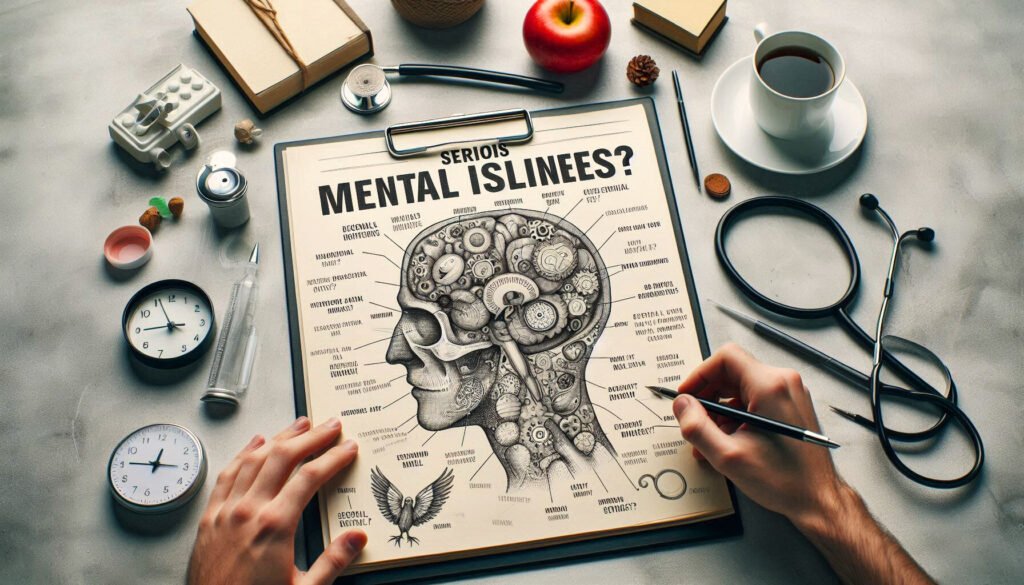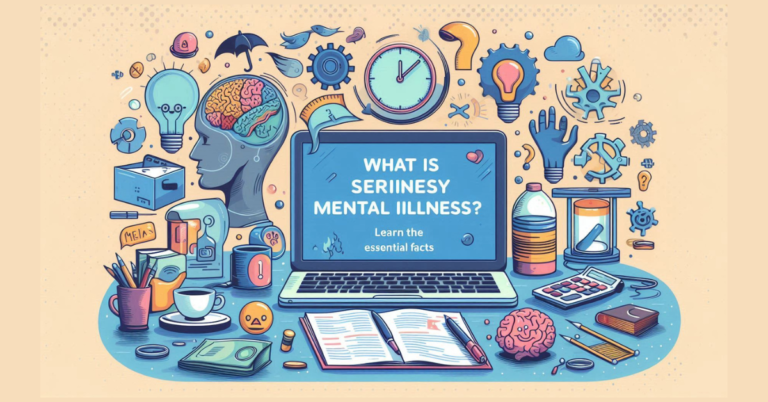In today’s world, understanding mental health is more crucial than ever. Serious mental illness (SMI) encompasses a range of severe psychiatric disorders that significantly impact an individual’s daily life and overall functioning. Despite its importance, serious mental illness remains a misunderstood topic for many. In this guide, we will delve into what constitutes serious mental illness, the signs to watch for, and how to seek help. Our aim is to provide clarity and encourage proactive steps towards mental health management.
What is Serious Mental Illness?
Serious mental illness refers to a range of mental health disorders that cause substantial distress or impair one’s ability to function in daily life. These conditions typically require ongoing treatment and support. Unlike common mental health issues, SMIs can severely disrupt personal, social, and occupational functioning.
Common Types of Serious Mental Illness
- Schizophrenia: Characterized by symptoms such as delusions, hallucinations, and disorganized thinking. Schizophrenia affects how a person perceives reality and can lead to significant impairments in social and occupational functioning.
- Bipolar Disorder: This disorder involves extreme mood swings, including manic and depressive episodes. These shifts can significantly impact a person’s ability to maintain stable relationships and job performance.
- Major Depressive Disorder (MDD): MDD is marked by persistent feelings of sadness, hopelessness, and a loss of interest in previously enjoyed activities. It can lead to severe impairments in daily functioning and quality of life.
- Obsessive-Compulsive Disorder (OCD): OCD involves unwanted, intrusive thoughts and repetitive behaviors aimed at reducing anxiety. This condition can be debilitating if not properly managed.
- Post-Traumatic Stress Disorder (PTSD): PTSD occurs after experiencing or witnessing traumatic events. Symptoms include flashbacks, severe anxiety, and emotional numbness, which can interfere with daily activities and relationships.

Symptoms of Serious Mental Illness
Recognizing the symptoms of serious mental illness is the first step towards seeking help. Common symptoms include:
- Persistent Mood Changes: Extreme highs or lows in mood that last for extended periods.
- Disorganized Thinking: Difficulty in organizing thoughts, speaking incoherently, or having trouble following a train of thought.
- Social Withdrawal: Avoidance of social interactions and withdrawal from usual activities.
- Hallucinations or Delusions: Experiencing things that are not present or holding false beliefs despite evidence to the contrary.
- Severe Anxiety or Paranoia: Intense fear or suspicion that affects daily functioning.
Diagnosis and Treatment
Diagnosing serious mental illness typically involves a comprehensive evaluation by a mental health professional. This may include:
- Clinical Interviews: Detailed conversations about symptoms, personal history, and current functioning.
- Psychological Testing: Assessments to evaluate cognitive and emotional functioning.
- Medical Evaluations: To rule out physical conditions that might mimic psychiatric symptoms.
Treatment often involves a combination of the following:
- Medication: Antipsychotics, mood stabilizers, antidepressants, and other medications may be prescribed to manage symptoms.
- Psychotherapy: Cognitive-behavioral therapy (CBT), dialectical behavior therapy (DBT), and other therapeutic approaches can help individuals develop coping strategies and address underlying issues.
- Support Services: Case management, vocational support, and social services can assist individuals in managing daily life and achieving personal goals.
Taking Action and Seeking Help
If you or someone you know is experiencing symptoms of serious mental illness, seeking help is crucial. Early intervention can lead to better outcomes and improved quality of life. Here are steps to take:
- Consult a Mental Health Professional: Schedule an appointment with a psychiatrist, psychologist, or therapist for an assessment and treatment plan.
- Reach Out for Support: Connect with support groups or community resources to find additional help and encouragement.
- Educate Yourself: Learning more about mental health can empower you to make informed decisions and advocate for yourself or loved ones.
Understanding serious mental illness is a vital step toward managing mental health effectively. By recognizing the signs, seeking timely help, and staying informed, individuals can take control of their mental well-being and lead fulfilling lives. Remember, mental health is just as important as physical health, and taking proactive steps is key to overall well-being. If you or someone you know is struggling, don’t hesitate to reach out for help—it’s the first step toward healing and recovery.
FAQ
1: What are the most common types of serious mental illness?
The most common types of serious mental illness include schizophrenia, bipolar disorder, major depressive disorder (MDD), obsessive-compulsive disorder (OCD), and post-traumatic stress disorder (PTSD). These conditions can significantly affect daily functioning and require comprehensive treatment for management and recovery.
2: How can I recognize the symptoms of serious mental illness?
Symptoms of serious mental illness may include persistent mood changes, disorganized thinking, social withdrawal, hallucinations or delusions, and severe anxiety or paranoia. If you or someone you know is experiencing these symptoms, it is important to seek professional help for an accurate diagnosis and appropriate treatment.
3: What steps should I take if I suspect someone has a serious mental illness?
If you suspect someone has a serious mental illness, the first step is to encourage them to consult a mental health professional for a thorough evaluation. Support them in seeking help from a psychiatrist, psychologist, or therapist. Additionally, connecting them with support groups and resources can provide further assistance and encouragement. Early intervention is crucial for effective treatment and recovery.


